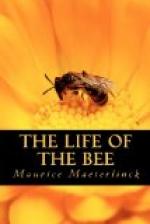[28]
This unwavering affection having come under the notice of man, he was able to turn to his own advantage the qualities to which it gives rise, or that it perhaps contains: the admirable political sense, the passion for work, the perseverance, magnanimity, and devotion to the future. It has allowed him, in the course of the last few years, to a certain extent to domesticate these intractable insects, though without their knowledge; for they yield to no foreign strength, and in their unconscious servitude obey only the laws of their own adoption. Man may believe, if he choose, that, possessing the queen, he holds in his hand the destiny and soul of the hive. In accordance with the manner in which he deals with her—as it were, plays with her—he can increase and hasten the swarm or restrict and retard it; he can unite or divide colonies, and direct the emigration of kingdoms. And yet it is none the less true that the queen is essentially merely a sort of living symbol, standing, as all symbols must, for a vaster although less perceptible principle; and this principle the apiarist will do well to take into account, if he would not expose himself to more than one unexpected reverse. For the bees are by no means deluded. The presence of the queen does not blind them to the existence of their veritable sovereign, immaterial and everlasting, which is no other than their fixed idea. Why inquire as to whether this idea be conscious or not? Such speculation can have value only if our anxiety be to determine whether we should more rightly admire the bees that have the idea, or nature that has planted it in them. Wherever it lodge, in the vast unknowable body or in the tiny ones that we see, it merits our deepest attention; nor may it be out of place here to observe that it is the habit we have of subordinating our wonder to accidents of origin or place, that so often causes us to lose the chance of deep admiration; which of all things in the world is the most helpful to us.
[29]




